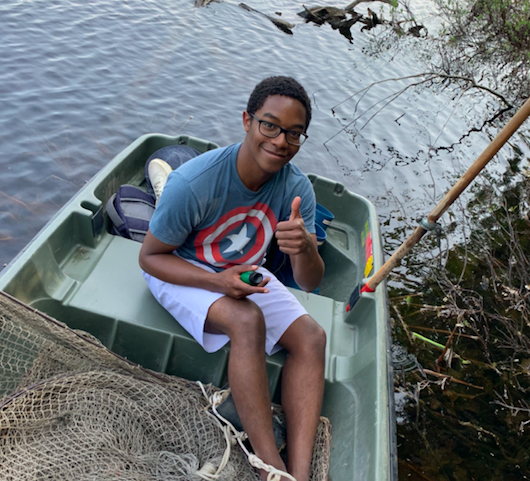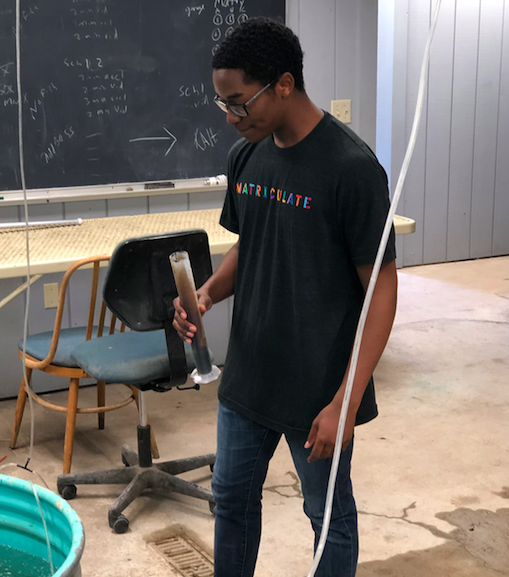
Interconnectedness.
In a word, that is how Matthew Aubourg '21 would describe his experience in the environmental sciences major. His studies have covered the interconnectedness of ecosystems, nature, climate, social justice, and people throughout the world, while Aubourg found himself building a strong and connected community within the major.
Though he entered his first year as a biology major on the pre-med track, he changed courses after his first semester after speaking to older students in his section in Keough Hall.
“My love for science goes beyond getting into medical school,” says Aubourg. “I wanted to explore different subjects, and when I found out how much more flexible the requirements are for environmental sciences, and as I started to think about what I really wanted to do, I switched. It was the best decision I could have made for myself.”
After Aubourg made the switch, he felt freer and began not only taking courses in the major, but also participating in fieldwork and lab work. During the summer of 2019, he spent 10 weeks in Michigan's Upper Peninsula at Notre Dame’s Environmental Research Center (UNDERC) East to do a field practicum, an opportunity many environmental sciences majors take part in. There is also an UNDERC West, which takes place in Western Montana.
“Not only did I have great research opportunities up there, but I got to spend time on some of the most beautiful land with like-minded students and meet a lot of researchers,” says Aubourg.
Specifically, he studied the way dissolved organic carbon impacts the behavior of bluegill fish, which, on a larger scale, demonstrates how climate change affects food web dynamics.
All environmental sciences majors are required to take a general ecology lab to gain fieldwork experience, practice writing scientific papers, and conduct laboratory research. The class includes a field trip to the Indiana Dunes each year to study how land changes over space and time, called "succession." The Dunes, Auborg says, are a historical place for successional studies and Notre Dame students have a unique opportunity to study there.
The major also includes a combination of courses within and outside of the College of Science, allowing for more student choice and a broader selection of electives than some other science majors. Students may also add an earth sciences concentration administered through the Department of Civil and Environmental Engineering and Earth Sciences.
During his first year, Aubourg joined Professor Neil Lobo’s research lab in the Eck Institute for Global Health, which conducts research on malaria vector intervention and prevention methods. Throughout the past four years, Aubourg has progressed from smaller-scale work to making important contributions to the project. Working with researchers from the Democratic Republic of the Congo, he has studied vector composition and behaviors throughout the country and presented his work at the College of Science’s Undergraduate Research Symposium.

Aubourg is also part of the Honors Program in Biology, as the environmental sciences major is housed within the Department of Biological Sciences, and has designed a project focused on human behavior and the risks of contracting malaria in the Democratic Republic of the Congo. He will have the opportunity to present his research in November at the annual American Society of Tropical Medicine and Hygiene conference.
Right now, Aubourg’s focus is on public health as he works on applying to doctorate programs. He feels that his switch from pre-med to environmental sciences did not take him far from his focus on community health.
In fact, he says it helped him cement his desire to see how the puzzle pieces of health and environmental factors fit together, and again, to focus on the interconnectedness of the natural world. His sustainability minor has also led him toward food justice initiatives in the South Bend community, though his project has come to a halt due to COVID-19 restrictions.
“One of my favorite parts of the major is the sense of community with the other students and professors,” says Aubourg. “You go through your four years with a lot of the same people, and that creates a support group to rely on. You also get so much flexibility in exploring the topics you care about. The environmental sciences major is the best decision I could have made.”